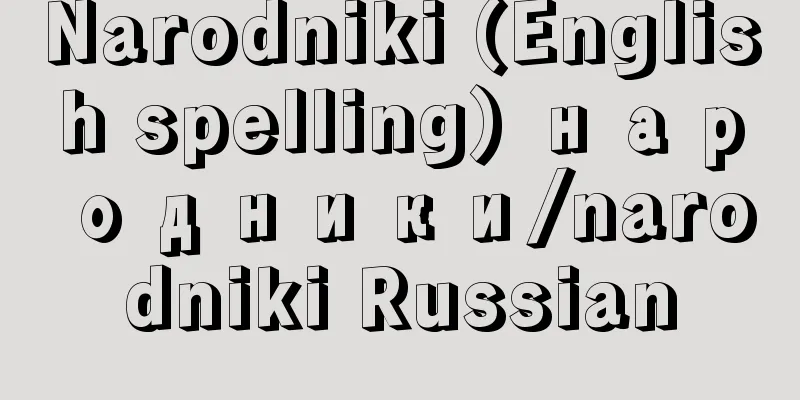Narodniki (English spelling) народники/narodniki Russian

|
The intelligentsia played a leading role in the Russian revolutionary movement in the second half of the 19th century. The original word comes from the Russian narod (people) and is translated as populist. There were various factions and trends, but overall they represented the interests of the people, especially the peasants, and criticized autocracy and serfdom. They also opposed the capitalization of Russia and advocated the realization of peasant socialism based on mirs (rural communities). This theory, which aimed for a "unique path" for Russia that differed from that of developed Western countries, was advocated particularly by Herzen and Chernyshevsky. Illegal organizations had been active since the late 1850s, but their anti-government activities intensified especially after the emancipation of the serfs, and at the end of 1861 the first full-scale secret society, "Land and Freedom" (First), was formed. "Land and Freedom" was suppressed and destroyed the following year, but young people, mainly students, responded to Herzen's call to "go among the people" and began to engage in one illegal activity after another. The attempted assassination of Alexander II in 1866 (the Karakozov Affair) was one such example. The central figures in these activities were the raznotsintsy (miscellaneous class intellectuals), including clergymen, lower-ranking officials, and merchants and craftsmen, who had emerged to replace the older generation of aristocratic intelligentsia. At the end of the 1860s, Lavrov advocated the need for enlightenment activities for the people in his "Historical Letters," but Bakunin criticized this and argued that the revolutionary instincts of the peasants should be ignited. The call for "B-Narod" preached by Lavrov and Bakunin reached a peak in the "Mad Summer" of 1874. Thousands of young men and women went among the peasants. However, the peasants did not understand their demand for socialism and instead turned them over to the police. The movement failed, and the revolutionaries went underground again. In 1876, the "Land and Freedom" (II) was founded, and one of its members, Zasulich, assassinated the mayor of St. Petersburg (1878). The association split into the "General Replacement" faction (Plekhanov, Akselrod, etc.), which rejected terrorist tactics and advocated a propaganda line, and the "People's Will" faction (Zhelyabov, Mikhailov, etc.), which aimed for a political revolution through terror. The latter succeeded in assassinating Alexander II on March 1, 1881. After the assassination of the Tsar, the "People's Will" faction was destroyed by severe repression, while the "General Replacement" faction disappeared due to Plekhanov's exile and transition to Marxism. From this time on, Marxists became the mainstream of the revolutionary movement, and many of the Narodniks became liberals and worked hard on social reform movements in local governments as teachers, doctors, municipal secretaries, craftsmen, etc. The Socialist Revolutionary Party (SR), which was established in the 20th century, also inherited the Narodnik traditions. [Takeo Kuryuzawa] "The Controversy over Russian Capitalism: A Study of the History of Narodnik Social Thought" by Walitski, translated by Hinanada Shizuma et al. (1975, Minerva Shobo) [Reference] |Source: Shogakukan Encyclopedia Nipponica About Encyclopedia Nipponica Information | Legend |
|
19世紀後半のロシア革命運動において主導的役割を果たしたインテリゲンチャ。原語はロシア語のナロードnarod(人民)に由来し、人民主義者と訳される。さまざまな党派、潮流が存在したが、全体的に、人民とくに農民の利害を代弁し、専制と農奴制を批判した。またロシアの資本主義化に反対し、ミール(農村共同体)を基盤とする農民社会主義の実現を説いた。西欧先進諸国とは異なるロシア「独自の道」を目ざすこの理論は、とくにゲルツェンやチェルヌィシェフスキーによって提唱された。 すでに1850年代後半から非合法的組織が活動していたが、とくに農奴解放後、その反政府活動は激化し、61年末には最初の本格的秘密結社「土地と自由」(第一次)の結成をみた。「土地と自由」は翌年弾圧を受けて壊滅したが、学生を中心とする青年はゲルツェンの「ブ・ナロード」(人民の中へ)の呼びかけにこたえて、次々に非合法活動に走った。1866年のアレクサンドル2世暗殺未遂事件(カラコーゾフ事件)はその一つであった。このような活動の中心にたったのは、旧世代の貴族インテリゲンチャにかわって登場した、聖職者、下級官吏、商手工業者などのラズノチンツィ(雑階級知識人)であった。1860年代末になるとラブロフがその『歴史書簡』において、人民に対する啓蒙(けいもう)活動の必要性を説いたが、バクーニンはこれを批判し、農民の革命本能に火をつけるべきことを主張した。ラブロフやバクーニンの説く「ブ・ナロード」の呼びかけは、1874年の「狂った夏」に最高潮に達した。数千人の青年男女が農民のなかへ入っていった。だが農民は彼らの社会主義実現の主張を理解せず、逆に彼らを警察に突き出した。運動は失敗し、革命派はふたたび地下に潜伏した。 1876年「土地と自由」(第二次)が結成され、そのメンバーであったザスーリチはペテルブルグ特別市市長を狙撃(そげき)した(1878)。結社はテロ戦術を否定して、プロパガンダ路線を主張する「総割替」派(プレハーノフ、アクセリロードら)と、テロによる政治革命を目ざす「人民の意志」派(ジェリャーボフ、ミハイロフら)に分裂した。後者は1881年3月1日アレクサンドル2世の暗殺に成功した。皇帝暗殺事件後、「人民の意志」派は激しい弾圧により壊滅し、他方「総割替」派は、プレハーノフの亡命、マルクス主義への移行などによって消滅した。このころからマルクス主義者が革命運動の主流となり、ナロードニキの多くは自由主義化し、教師、医師、自治体書記、職人などとして地方自治体における社会改良運動に励むことになった。20世紀に入って成立した社会革命党(SR(エスエル))もナロードニキの伝統を継承している。 [栗生沢猛夫] 『ヴァリツキ著、日南田静真他訳『ロシア資本主義論争――ナロードニキ社会思想史研究』(1975・ミネルヴァ書房)』 [参照項目] |出典 小学館 日本大百科全書(ニッポニカ)日本大百科全書(ニッポニカ)について 情報 | 凡例 |
<<: Nahua - Nawa (English spelling)
>>: Narodnaya Mountain (English spelling)
Recommend
Permanent deformation
When a force is applied to a solid to deform it, i...
Leave of absence - leave of absence
...(c) refers to cases where an employee is engag...
Conjugation word - Hogougo
It is a language with a structure in which one wo...
Sprawl - sprawl
This refers to the situation in urban areas that ...
Iris Konfusa - Iris Konfusa
...Variegated leaves are rare. Beautiful hybrids ...
Horoscope
...The universe is a huge organism, and the struc...
Isle of Wight - Isle of Wight
…In ancient times it was called Vectis. Until 197...
Karadžić, Radovan
Born June 19, 1945 in Savnik, Yugoslavia. Bosnian ...
Martí, José Julián
Born: January 28, 1853, Havana [Died] May 19, 1895...
Auction - Keito
〘Noun〙 Boat race. A boat race held in Nagasaki in ...
Yoshida Kanetomo
1435-1511 (Eikyo 7-Eisho 8) A Shinto priest in the...
Dendrobium okinawense (English name) Dendrobium okinawense
… [Ken Inoue]. … *Some of the terminology that me...
Akigiri - Akigiri
A perennial plant of the Lamiaceae family (APG cl...
Hakusai (Chinese cabbage) - Hakusai (English spelling) Brassica rapa var. amplexicaulis (B. pekinensis); Chinese cabbage
A biennial plant of the Brassicaceae family, nativ...
Robed nobility - French for "houfukukizoku" (English: Noblesse de robe)
The new nobility was made up of holders of high-r...









